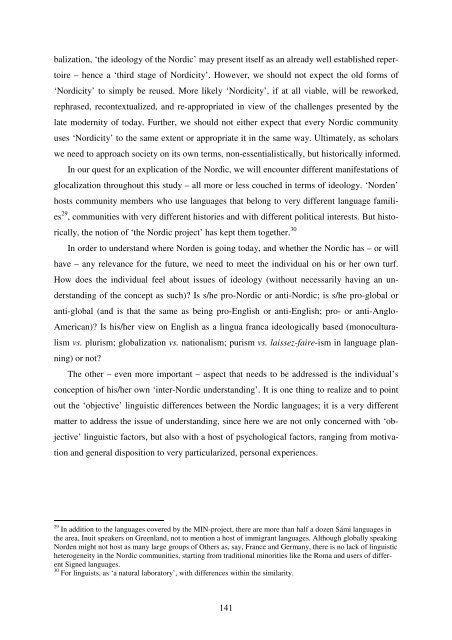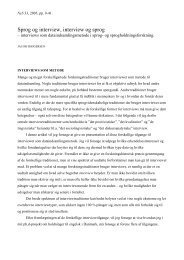Hør dog hvad de siger - Note-to-Self: Trials & Errors
Hør dog hvad de siger - Note-to-Self: Trials & Errors
Hør dog hvad de siger - Note-to-Self: Trials & Errors
Create successful ePaper yourself
Turn your PDF publications into a flip-book with our unique Google optimized e-Paper software.
alization, ‘the i<strong>de</strong>ology of the Nordic’ may present itself as an already well established reper-<br />
<strong>to</strong>ire – hence a ‘third stage of Nordicity’. However, we should not expect the old forms of<br />
‘Nordicity’ <strong>to</strong> simply be reused. More likely ‘Nordicity’, if at all viable, will be reworked,<br />
rephrased, recontextualized, and re-appropriated in view of the challenges presented by the<br />
late mo<strong>de</strong>rnity of <strong>to</strong>day. Further, we should not either expect that every Nordic community<br />
uses ‘Nordicity’ <strong>to</strong> the same extent or appropriate it in the same way. Ultimately, as scholars<br />
we need <strong>to</strong> approach society on its own terms, non-essentialistically, but his<strong>to</strong>rically informed.<br />
In our quest for an explication of the Nordic, we will encounter different manifestations of<br />
glocalization throughout this study – all more or less couched in terms of i<strong>de</strong>ology. ‘Nor<strong>de</strong>n’<br />
hosts community members who use languages that belong <strong>to</strong> very different language famili-<br />
es 29 , communities with very different his<strong>to</strong>ries and with different political interests. But his<strong>to</strong>-<br />
rically, the notion of ‘the Nordic project’ has kept them <strong>to</strong>gether. 30<br />
In or<strong>de</strong>r <strong>to</strong> un<strong>de</strong>rstand where Nor<strong>de</strong>n is going <strong>to</strong>day, and whether the Nordic has – or will<br />
have – any relevance for the future, we need <strong>to</strong> meet the individual on his or her own turf.<br />
How does the individual feel about issues of i<strong>de</strong>ology (without necessarily having an un-<br />
<strong>de</strong>rstanding of the concept as such)? Is s/he pro-Nordic or anti-Nordic; is s/he pro-global or<br />
anti-global (and is that the same as being pro-English or anti-English; pro- or anti-Anglo-<br />
American)? Is his/her view on English as a lingua franca i<strong>de</strong>ologically based (monocultura-<br />
lism vs. plurism; globalization vs. nationalism; purism vs. laissez-faire-ism in language plan-<br />
ning) or not?<br />
The other – even more important – aspect that needs <strong>to</strong> be addressed is the individual’s<br />
conception of his/her own ‘inter-Nordic un<strong>de</strong>rstanding’. It is one thing <strong>to</strong> realize and <strong>to</strong> point<br />
out the ‘objective’ linguistic differences between the Nordic languages; it is a very different<br />
matter <strong>to</strong> address the issue of un<strong>de</strong>rstanding, since here we are not only concerned with ‘ob-<br />
jective’ linguistic fac<strong>to</strong>rs, but also with a host of psychological fac<strong>to</strong>rs, ranging from motiva-<br />
tion and general disposition <strong>to</strong> very particularized, personal experiences.<br />
29 In addition <strong>to</strong> the languages covered by the MIN-project, there are more than half a dozen Sámi languages in<br />
the area, Inuit speakers on Greenland, not <strong>to</strong> mention a host of immigrant languages. Although globally speaking<br />
Nor<strong>de</strong>n might not host as many large groups of Others as, say, France and Germany, there is no lack of linguistic<br />
heterogeneity in the Nordic communities, starting from traditional minorities like the Roma and users of different<br />
Signed languages.<br />
30 For linguists, as ‘a natural labora<strong>to</strong>ry’, with differences within the similarity.<br />
141



